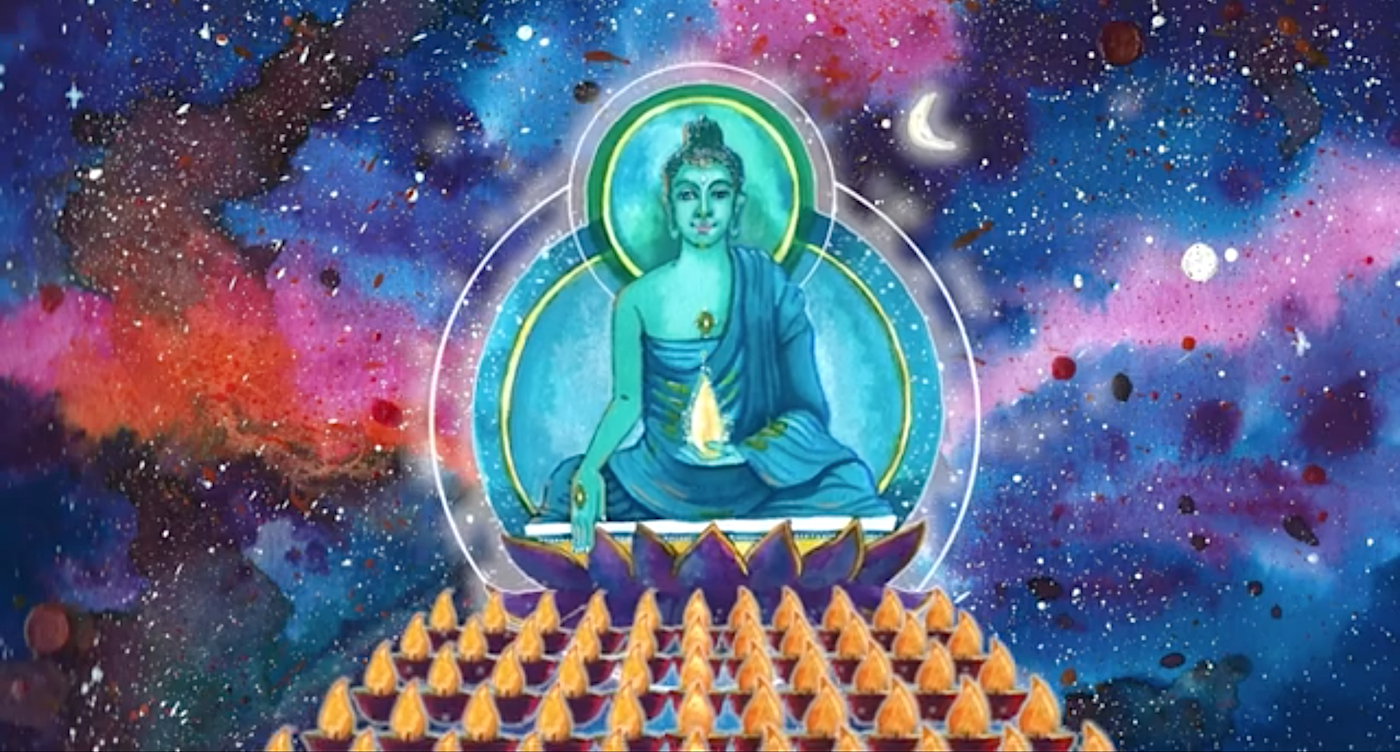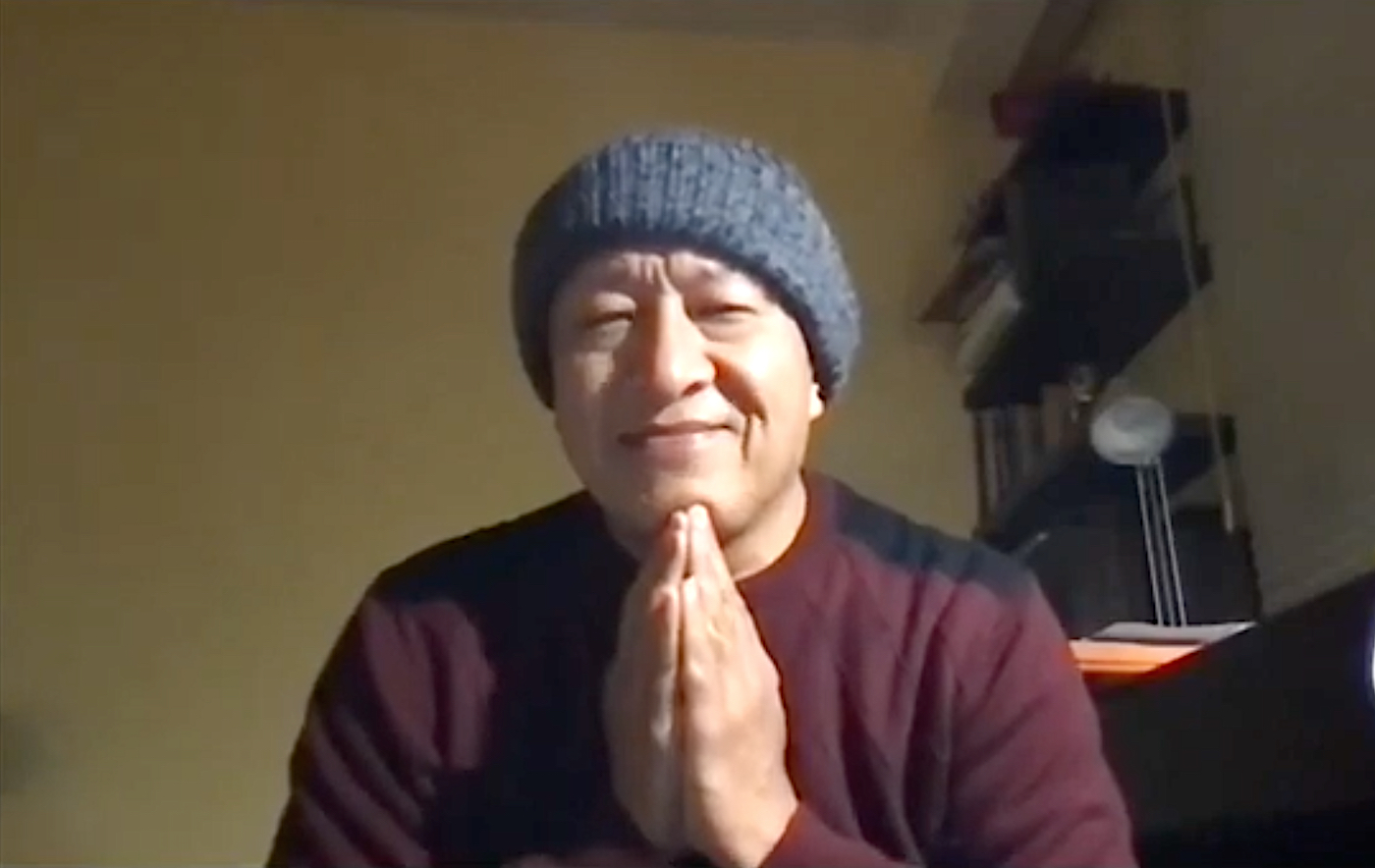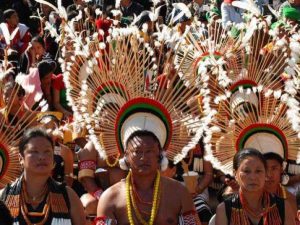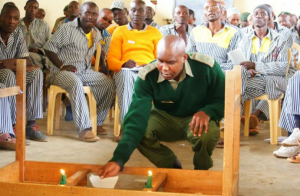
The renowned Bhutanese lama, filmmaker, and author Dzongsar Jamyang Khyentse Rinpoche led a global online celebration of the Buddha to mark the beginning of the New Year, and announced during the event that Bhumisparsha: Touching the Earth, a global initiative to accumulate recitations of the Mantra of Shakyamuni Buddha, would continue into 2021, having achieved unexpected success over a little more than five months in 2020.
The New Year gathering, titled “On His Lotus Seat: A Celebration of the Buddha,” which was conducted twice on 1 January, showcased creative offerings from around the world honoring the Buddha, including musical performances, short films, and a bilingual sutra recitation of Taking Refuge in the Three Jewels, which was recently translated into English by 84000: Translating the Words of the Buddha, and into Chinese by The Kumarajiva Project.*
The global event was organized by Bhumisparsha (a project of Siddhartha’s Intent India), 84000: Translating the Words of the Buddha, and The Kumarajiva Project (a Khyentse Foundation initiative) as an opportunity to revisit the foundation of the Buddhadharma: refuge in the Three Jewels, the Buddha, the Dharma, and the Sangha.
“Well, 2020 has become history now. And it’s a history that is, I think, for many reasons something that cannot be forgotten easily. Of course, hopefully we have learned a lot of lessons,” Dzongsar Khyentse Rinpoche said in his address during the evening event. “One can only hope that as fragile, tiny, insignificant human beings we have proven to ourselves quite well this time that we are just so, so, so, so small when faced with this mighty situation. So, as a human, one can only hope that the new year will bring us something much better. . . .”
“In some ways, what has gone on during 2020 is really of our own making,” Rinpoche continued. “Our leaders have forgotten to treat us as citizens. They treat us as consumers. But then it’s not really the fault of our leaders, either—we also enroll ourselves as consumers. We abuse the only dwelling place that we have, the Earth. Really, it’s just incredible the way we abuse; almost every step we take is somehow a contribution toward the destruction of this Earth. You know, we tend look down on animals as ignorant, but a lot of animals do much more for the Earth than us.”
The evening also marked the conclusion of the global Bhumisparsha mantra accumulation project, which was launched on 24 July last year with the objective of reaching at least 100 million global recitations of the Shakyamuni Mantra by 1 January 2021, for the benefit of “Earth, for humanity, for animals, and for all sentient beings.” Over the course of the second half of 2020, the accumulation quickly surpassed the original target of 100 million recitations in just seven weeks, and by the end of the year a total of 588,281,962 recitations of the Shakyamuni Mantra had been recorded around the world.**
Rinpoche explained: “When Shakyamuni Buddha was about to attain enlightenment, just moments before, when Mara appeared and was challenging him, Shakyamuni gave a lot of answers, and Mara finally asked: ‘How do you know you’re telling the truth?’ It was at that moment that Shakyamuni Buddha touched the earth; Bhumisparsha, calling the earth to witness. I’ve always wondered: why the earth, why not something else? But it really makes sense. Of course, there are many different levels of the earth or the ground or the base, but the most visible, most tangible, most immediate ground or base that we can relate to is this Earth that we are sitting on right at this very moment.
“So it must have been for one of these simple reasons that a few months ago many venerable lamas suggested that we do this Shakyamuni Mantra accumulation and then the idea came for the Bhumisparsha project. As we have just been informed, because people have been so incredibly dedicated, we achieved so much more than we had originally planned. And not only the mantras: there have been so many expressions of love, kindness, gentleness, serenity, sanity, through music, art, and poetry, and each of them is so valuable that we really have to archive it.”
Acknowledging the unanticipated scale of the response to the project from Buddhists all around the world, Rinpoche announced that Bhumisparsha: Touching the Earth would continue into 2021, building on the enthusiasm, positive energy, and merit already generated:
“Because we had such an incredible response to this project, although we originally planned to finish on 1 January, how can we now? So I’m very excited to inform you now that Bhumisparsha is going to continue. We are already thinking about different activities that we can engage in to really touch the earth—even literally touch the earth. I mean, just imagine, if every human being on this Earth, every day, just for a moment, could be aware that we are sitting on Earth. Just that alone, how much wonder it would create!
“And not only touching the external earth, but the inner earth or the base or ground—our sanity. We all have a basic sanity within us. You know, when someone is drunk it means that there is a time when he’s not drunk—that’s why there’s this phenomenon called ‘drunk.’ And just like that, of course, we have greed and anger and jealousy and hope and fear and ambition, and so on. But underneath all of that, there is a sanity, there is a basic goodness. And that you don’t have to learn from somebody, you don’t have to download it, you just have it. And we have to fish it out. We have to discover it. We have to create a chance for this sanity.”

Born in Bhutan in 1961, and now based in Himachal Pradesh, India, Dzongsar Khyentse Rinpoche is the son of Thinley Norbu Rinpoche and was a close student of the Nyingma master Dilgo Khyentse Rinpoche (1910–91). He is recognized as the third incarnation of Jamyang Khyentse Wangpo, founder of the Khyentse lineage, and the immediate incarnation of Jamyang Khyentse Chökyi Lodrö (1893–1959). His projects and initiatives include Siddhartha’s Intent, an international collective of Buddhist groups supporting Rinpoche’s Buddhadharma activities by organizing teachings and retreats, distributing and archiving recorded teachings, and transcribing, editing, and translating manuscripts and practice texts; Khyentse Foundation, which promotes the Buddha’s teaching and supports all traditions of Buddhist study and practice; 84000, a non-profit global initiative to translate the words of the Buddha and make them available to all; Lotus Outreach, which directs a wide range of projects to help refugees; and more recently The Lhomon Society, which promotes sustainable development in Bhutan through education.
* New Year Refuge: A Global Celebration of the Buddha (Buddhistdoor Global)
** Bhumisparsha: Global Shakyamuni Mantra Accumulation Reaches 4.7 Million Recitations (Buddhistdoor Global)
The Filmmaker and the Musician: Dzongsar Khyenste Rinpoche Collaborates with Kanho Yakushiji for Global Mantra Accumulation (Buddhistdoor Global)
Bhumisparsha: Global Shakyamuni Mantra Accumulation Surges Past 100 Million Recitations (Buddhistdoor Global)
Bhumisparsha: Global Shakyamuni Buddha Mantra Accumulation Poised to Top 500 Million Recitations (Buddhistdoor Global)
See more
Siddartha’s Intent
Siddhartha’s Intent India
Bhumisparsha: Touching the Earth (Siddhartha’s Intent India)
84000: Translating the Words of the Buddha
Khyentse Foundation
The Kumarajiva Project (English)
The Kumarajiva Project (Traditional Chinese)
The Kumarajiva Project (Simplified Chinese)














